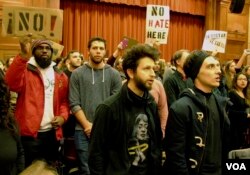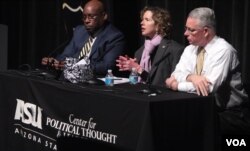Student Union
Should Only Some Speech Be Allowed on Campus?
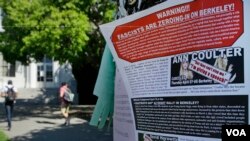
Last month, a student group at Vermont’s Middlebury College invited Charles Murray, a political scientist and fellow at the prestigious conservative think tank American Enterprise Institute, to speak on campus.
Murray was greeted by hundreds of protesters who shouted over him when he tried to speak. As the crowd refused to let up, college administrators escorted Murray to another building where he conducted his talk, with Middlebury professor Allison Stanger, via livestream.
As Stanger and Murray left the building, they were “physically and violently confronted by a group of protesters,” college spokesman Bill Burger said in a statement.
Protesters “violently set upon [their] car, rocking it, pounding on it, jumping on and trying to prevent it from leaving campus,” Burger said.
Stanger was treated at a hospital emergency room and left wearing a neck brace following the violent confrontation with protesters, one of whom grabbed her by the hair and yanked her backward.
“I feared for my life,” Stanger later wrote in a post on Facebook.
Earlier this month, students at Claremont McKenna College in California targeted Heather Mac Donald, a Manhattan Institute scholar and prominent critic of the Black Lives Matter movement, with mob violence in response to her attempted speech.
MacDonald, who was also invited to speak on campus by a student group, saw protesters physically block the doors to the building where she was scheduled to speak. She was forced to deliver the speech via livestream, to a largely empty room, as the protesters refused to allow anyone to pass.
The protesters banged on windows and shouted from outside the building until “the cops decided that things were getting too chaotic and I should stop speaking," MacDonald later said of the incident.
Police officers then had to sneak MacDonald out the building’s back door so she could safely escape the protesters.
Following MacDonald’s doomed speech, more than two dozen students signed an open letter to one of the school’s president’s, David Oxtoby, assailing MacDonald as a “fascist” and a “white supremacist” and demanding Claremont “take action” against an independent student newspaper for its coverage of the protests and its “continual perpetuation of hate speech.”
“Why are you, and other persons in positions of power at these institutions, protecting a fascist and her hate speech and not students that are directly affected by her presence?” the students asked of Oxtoby.
Oxtoby had previously condemned the protests and defended MacDonald’s right to speak on campus, citing the college’s commitment to “the exercise of free speech and academic freedom.”
The students argued that MacDonald is a well-known figure, with her views well-documented, so refusing her a platform to speak didn’t violate her rights. Further, the students said, they consider MacDonald’s mere presence on campus “a form of violence.”
Incidents like the ones at Middlebury and Claremont have become increasingly common on American college campuses, according to Will Creeley, senior vice president of legal and public advocacy at the Foundation for Individual Rights in Education (FIRE), a group promoting free speech for college students.
“It’s deeply troubling,” he told VOA in an interview. “We have seen an unfortunate outbreak of violence in response to controversial speakers on campus.”
He said the violence is driven largely by a perceived lack of consequences for violent actors and a lack of knowledge among students of basic speech laws in the United States.
“Capitulating to threats of violence only goes to further embolden that illiberal response,” Creeley said. “Violence at these events will beget more violence and we are seriously concerned that someone is going to get hurt.”
In a 2015 YouGov survey, 43 percent of students said, “Making sure that students have an environment free from discrimination, even if that means placing some limits on what students can say” should be more of a priority for colleges than protecting the “absolute right to free speech.”
A similar 2016 survey conducted by Gallup shows that, by a 52 percent to 42 percent margin, students believe that their institution should forbid people from speaking on campus who have a history of engaging in “hate speech.”
But, as Creeley told VOA, “there is no hate speech exception to the First Amendment.
“There is an unfortunately prevalent problem of students being unaware of the extent of their rights and the rights of their peers,” he said.
This discussion over First Amendment rights came to a head this week when the University of California-Berkeley preemptively cancelled a scheduled speaking event by conservative provocateur Ann Coulter, citing concerns that the school couldn’t control a potentially violent reaction to Coulter’s presence.
The cancellation followed several violent incidents on the Berkeley campus this year, including a riot in February when far-right journalist Milo Yiannopoulos was invited to speak. That incident resulted in more than $100,000 of damage to buildings on campus.
The school’s decision to cancel Coulter touched off a firestorm of controversy, leading Berkeley to reverse its move and reschedule Coulter’s talk at a time when less people would be on campus. This didn’t sit well with the student group that invited Coulter to campus, so, on Monday, they filed a lawsuit against the school alleging discrimination against the speaker.
“This case arises from efforts by one of California’s leading public universities, UC Berkeley – once known as the “birthplace of the Free Speech Movement” – to restrict and stifle the speech of conservative students whose voices fall beyond the campus political orthodoxy,” the lawsuit, filed by Harmeet Dhillon on behalf of the Berkeley College Republicans, reads.
A spokeswoman for the school, Diane Klein, called the allegation that Coulter is being unfairly punished for her political point of view “untrue.”
“The university welcomes speakers of all political viewpoints and is committed to providing a forum to enable Ann Coulter to speak on the Berkeley campus,” she said in a statement.
The university offered to let Coulter speak May 2, but Dhillon said this time slot is unacceptable, because students will be studying for finals.
Please leave a comment here, and visit us on Facebook, Twitter, Instagram and LinkedIn, thanks!
See all News Updates of the Day
Universities in Middle East building research relationships with China

As China bolsters research relationships with universities in the Middle East, the United States has taken notice – especially when that research involves artificial intelligence.
Reporting for University World News, Yojana Sharma has the story. (March 2024)
Tips for staying safe while studying in the US
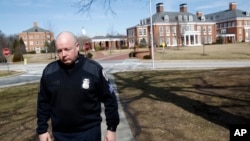
Recent news events have raised safety concerns among some international students studying in the United States.
Adarsh Khandelwal, writing in the India Times, has tips for staying safe from the moment you arrive until the day you complete your studies. (March 2024)
Some colleges are making digital literacy classes mandatory

A 2019 study by Stanford found that most college students can’t tell the difference between real and fake news articles. Amid rampant online disinformation, and the threat of AI-generated images, some schools are making students learn “digital literacy” to graduate.
Lauren Coffeey reports for Inside Higher Ed. (March 2024)
With federal student aid delays, students aren’t sure what college will cost
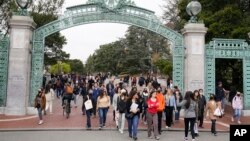
The U.S. Department of Education’s federal student aid form (FAFSA) experienced serious glitches and delays this year.
Now, many students have been admitted to college, but don’t know how much money they’ll need to attend.
Read the story from Susan Svrluga and Danielle Douglas-Gabriel for The Washington Post. (March 2024)
Senator draws attention to universities that haven’t returned remains
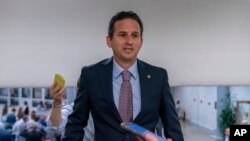
More than 70 U.S. universities continue to hold human remains taken from Native American burial sites, although those remains were supposed to be returned 30 years ago.
Jennifer Bendery writes in Huffington Post that one senator has been using his position in an attempt to shame universities into returning remains and artifacts. (April 2024)




